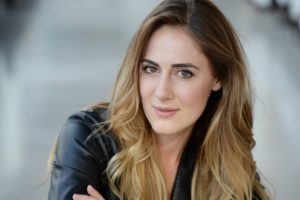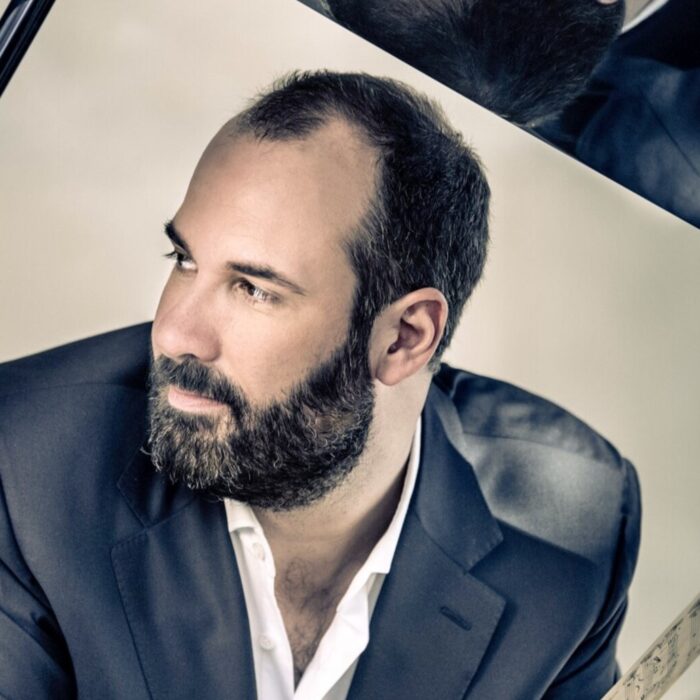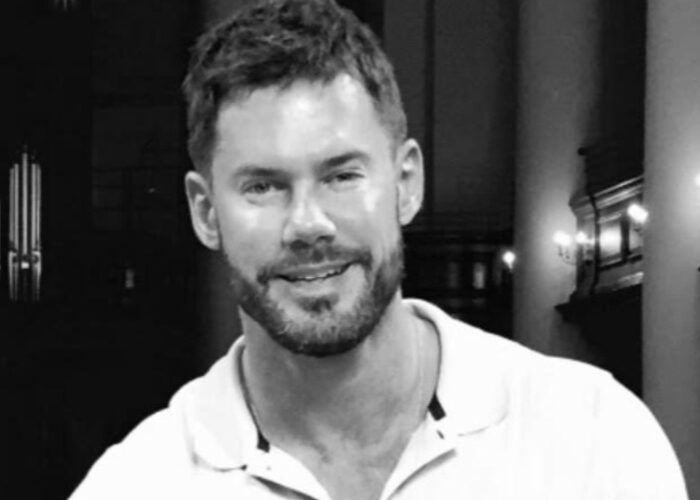
Q & A: Sydney Mancasola on French Opera, Big Paris Break & COVID-19
By Dejan Vukosavljevic(Credit: ©Barbara Anmüller)
“Comedy today, tragedy tomorrow.”
American soprano Sydney Mancasola uttered these words before going to the stage at the Adelaide Festival on March 13 2020, in the role of Bess in opera “Breaking the Waves.” The opera had a second performance on March 15, and at that time the coronavirus pandemic already begun its deadly march across Europe and the Americas. Mancasola couldn’t possibly know if she would be able to get out of Australia under such circumstances – yet, she boldly did what she had to do.
Born in Redding, California, Mancasola showed her early love for classical music at the age of two, when she began playing violin.
Mancasola subsequently went on to study voice at the Oberlin Conservatory of Music in Ohio, where she completed her Bachelor of Music degree in 2011 and was the recipient of the Margot Bos Standler Scholarship. She was a Grand Finals winner of the 2013 Metropolitan Opera National Council Auditions, and a winner of the 2016 Mabel Dorn Reeder Foundation Prize from Opera Theatre of Saint Louis, among others.
The soprano has appeared at the greatest world’s opera stages, including the Metropolitan Opera House, Opéra National de Paris, English National Opera, Washington National Opera, Oper Frankfurt, Komische Oper Berlin, Florida Grand Opera, Des Moines Metro Opera, Opera Theatre of Saint Louis, Oper Köln, and Palm Beach Opera, among others.
OperaWire spoke to Mancasola after her role debut in Offenbach’s “Orphée aux enfers” at the Komische Oper Berlin.
OperaWire: You had a big role debut last night in Offenbach’s “Orphee aux enfers.” How did you connect with Eurydice onstage? How would you describe Eurydice?
Sydney Mancasola: Barrie described her to me during a rehearsal as a “good time girl,” and I like that description. Infidelity is a big part of the piece, and she is clearly a discontended woman looking for something else. Eurydice is not a deep thinking girl, she just goes with her urges. She just wants to have a good time, and to feel free. She is not aware of the ramifications of her actions.
Yet she is a multifaceted character. She can be horrible at one moment, and then absolutely fabulous in another moment, and pretty much anything in between. It is interesting to portray a woman onstage who actually challenges the idea of what a woman onstage should be. Eurydice is a very flawed person, and that breaks a stereotype for the central female character.
I really liked the idea of exploring something onstage that I wouldn’t explore in my real life. All that infidelity, and this woman who is unfiltered, that is not at all who I am. So there is potential for a dramatic transformation. I wouldn’t allow that freedom in my real life, but I can live it onstage. It is quite liberating. When I perform characters that are similar to me in a real life, I somehow feel less free as a person. The comedy in “Orphée aux enfers” is so rich, and it is truly satisfying to be able to bring it to the audience.
OW: Tell us more about the collaboration with director Barrie Kosky. What do you find the most attractive in this staging of “Orphee aux enfers?”
SM: It is fascinating what he purged out of his creative soul for this piece. Offenbach was really trying to create a mirror for the society, for false appearances, for dirty secrets, for people looking for outlets for their carnal desires. And when you bring all of that to the stage in the 21st Century in Berlin, the question is how our relationship with the concepts of marriage and fidelity has changed. The story of Orpheus has been used in opera so much already. When it reached Offenbach, there were already several versions, so we have to ask ourselves what was Offenbach trying to say with the story. Offenbach puts Eurydice at the center, which changes our perspective of the narrative. We finally get her side of the story. Or at least Offenbach’s take on her side.
I have a feeling that Barrie really understands the repression of the female energy that gets stuck in these prototypes that we put women into onstage. With Eurydice, he seems to open up what is possible for the female character. Of course, he wants to create entertainment first, and that is also a big part of this production. Secondly, he doesn’t want a stereotypical woman, ever. He wants to fully explore a woman’s character onstage, to let her step out of bounds and be first a person, then a woman.
OW: What do you think that audiences took away from the premiere?
SM: I have never heard an audience go this crazy in a premiere before. I think they saw this massive energy onstage and reacted to it. We had to stop all the time and let them finish laughing, so we can continue. It seemed as if the audience was so hungry for this humor.
Barrie’s style is in essence controversial, so not everyone is going to be okay with that. If we always create things that are polite then we’re not pushing the envelope, and never exploring unchartered territories. People who push those boundaries are people who blaze the trails and create new opportunities for expression.
OW: In October and November you had a big house debut at Opéra de Paris. What was so compelling about that production of “L’elisir d’amore?” How well does Donizetti resonate with other Italian masters?
SM: Italian opera is so rich, and my Italian heritage makes me feel very deeply connected to this repertoire. The great Italian composers all have their own distinct flavor. For me, Donizetti is slightly more technically oriented than the other Italian masters, like Verdi, or Puccini. To me, his music also feels slightly less overtly emotional, compared to say, Verdi whose music feels like it’s coming straight from the soul. You can feel a slight detachment with Donizetti, but not in a bad way – it just feels a bit more composed. He also wrote so well for the voice. When you sing his music you really feel like Donizetti understood how to showcase the best of what the human voice has to offer. I’m constantly using Donizetti in my practice sessions, particularly Lucia, as a technical learning tool because the voice has to be absolutely aligned.
However, “L’elisir d’amore” is indeed an emotionally rich piece. It is a very tender story with vibrant characters. Unlike Eurydice, I feel very similar to Adina. There are so many aspects of her personality that I can understand and can relate to. She likes to lead with her head, and not with her heart, and simply wants to know what makes the most sense and what’s the most practical thing to do. This head over heart struggle catches up with her in the opera because her feelings have grown outside of her reason. I love the arch of her character because she is so completely changed by the love she feels for Nemorino.
When compared to Gilda for example, vocally, the tessitura is similar. Adina tends to sit more in the middle voice than other belcanto roles. Gilda sits a bit higher, and her lines are a little bit closer to verismo. However, for both roles you need to have that seamless spin through the registers.
OW: Singing the four heroines in “Les contes d’Hoffmann” is another puzzle. Does this reveal your love for French opera? Do the French heroines you have portrayed so far have anything in common?
SM: I don’t know what it is about the French opera, but it just makes me tick. Vocally, there is something in the French language where the sensation of singing it feels so good. The way my voice works, the vowels and the consonants along with the way that a lot of French music is composed to use all of the registers just feels right for me. I feel at home in this repertoire, and my voice doesn’t feel as challenged or pushed to the extremes. I’ve been very lucky to sing lots of French opera very early in my career, and I am excited that I also have quite a few French roles, Mélisande and Manon for example, in the coming seasons.
In terms of the characters, I feel that the French women I portray are less overtly emotional. They feel a bit more enigmatic. I like this sparkly enigmatic quality of the French music, and of the French heroines. Manon for example, I have never really met a woman like her, but with Adina, I exactly know who she is. For me, portraying the women in the French repertoire can be more intriguing.
OW: What are the specific steps you take when you prepare for French opera? What are the similarities with other composers, and where lie the differences?
SM: When I rehearse French opera, I don’t need so much time to get my voice into the style. On the other hand, Massenet gets you as many as six musical markings to one bar, and they are very specific. It takes a lot of time to make sure that you’re giving what the composer intended. With so many musical markings it’s easy to take them for granted. You need to memorize those markings like you memorize the text, and that is a technical challenge. I always allow enough time to let that sink in.
OW: Having sung big baroque roles such as Cleopatra in “Giulio Cesare” and Semele, how fast can you switch to non-baroque music? What is so soul-nurturing in Händel’s masterpieces?
SM: I did Semele and Pamina in Berlin in 2019 just a few days apart. It’s different for everyone, but for me it was an okay marriage. Both Semele and Pamina sit a bit lower in my voice than some of my other repertoire, and they are both nicely connected to a chest resonance. But yes, sometimes switching between different types of technical singing is a challenge. For example, in the spring I rehearsed Eurydice and also Fiordiligi for the Luzerner Theater. And that was not the best combination. However, I was performing only Fiordiligi. We knew that Orpheus at the Komische Oper would be canceled, so I didn’t have to go 100 percent into it.
I learned that these two roles wouldn’t be ideal to have next to each other. As I grow as an artist I look longer term, and that is really helpful in all these switches of styles. Ultimately, one is medicine for the other. Singing baroque is really good for the more romantic things that I do, and vice versa.
The structures of baroque music are so pure. When you find a master like Händel who was able to sparingly use the more complex harmonies in order to find the perfect single note that cuts to the core, it feels perfect. There are fewer ingredients, but when the magic happens it is sublime. It’s so distilled. There is this strange feeling that baroque music provokes in me, I can somehow connect it to pop music and it often feels very sensual.
I tend to use simple ornamentation when singing Händel’s music, specifically in slower pieces. It depends on the specific aria, as some call for more ornamentation. It also depends on the production and the piece. For example, during “Giulio Cesare” I did more ornamentation that I am used to, because the ornaments all made perfect sense in that particular production.
In “Semele” the conductor and I both believed that not much ornamentation was needed. I’m very open when it comes to ornamentation and love the collaborative process behind finding the right ornaments to fit the role and the production. It’s not often that we get a hand in writing the music that we sing, so I see it as a very special opportunity to get creative.
OW: Mozart also has a big place in your repertoire. You debuted Fiordiligi in Luzern this year. How do you perceive Mozart’s timeless music?
SM: I’ve had a connection with Mozart’s music since my early years, as I have been growing up playing his sonatas on my violin. Mozart was like my first language, as I played his music before I learned to read or write. The challenge with Mozart these days is that it can be difficult to make the stories feel relevant. I am personally very picky about the Mozart roles that I do. Pamina works perfectly, and also Susanna in “Le Nozze di Figaro.” Fiordiligi was shocking, as it was very comfortable vocally, and that surprised me. Fiordiligi is also very emotionally rich. She is really at a crossroads in her relationship, and I believe her struggle. Mozart’s characters are so complex, but out of the context of the period in which they were written, they can be misunderstood.
The height of my voice makes finding the right Mozart roles a bit difficult, as Mozart didn’t write as high for sopranos. There are exceptions of course, such as Konstanze in “Die Entführung aus dem Serail,” or the Queen of the Night; But this is a completely different fach for me. I would like to sing Donna Elvira in the future. The character of Donna Elvira in particular attracts me to the role.
For now I feel somehow that my metabolism is a bit more active for the roles such as Donna Anna, or the Countess Almaviva, as they are so suspended, as if floating on air. At this point of my life I still have too much fire in my belly for these roles.
OW: During your career you have sung lots of very different roles that require different techniques and approaches. How do you nurture the vocal versatility that presents as something naturally given to you?
SM: I feel that I am always straddling two fachs. If you’re a coloratura soprano, it’s pretty clear what your voice does, and if you are a true lyric soprano, it’s also clear which roles you do. I am sitting just somewhere in between, and I am doing a bit on both sides. Ultimately, I think it is this jumping around that keeps my voice healthy. It’s not always perfect, and sometimes I feel a bit stretched. However, I enjoy it, and my voice has to stay flexible due to diversity of the repertoire.
The roles that employ both skill sets are where I feel the most at home. Take Manon, for example – she has very lyrical singing, but also a lot of coloratura, and that is why I feel so comfortable in that role. Gilda and Violetta are the same, as are roles such as Leila and Juliette.
OW: Where do you find strength to endure such challenging times, and to thrive as an artist at the same time?
SM: Artists need to protect their health, just like everybody else. We put ourselves at risk by performing right now. We just can’t shelter and work from home, so we need to be mindful about how that is affecting us physically and psychologically.
As artists we just experienced something quite intense, as we were kind of muzzled by the sudden stop of culture. It happened very abruptly when our channel of communication with the audience was simply cut off. Of course, a large crisis is happening, affecting many people and we have to be focused on keeping people safe and healthy, and doing what’s best for the greater good. As artists we understand this. It was difficult to put our livelihood on hold, but we understood it was necessary.
However, on a psychological level we felt silenced. There’s nobody to blame for it. I had a year of work that was canceled literally overnight and with no financial compensation. I had prepared all of those notes, all the music, and imagined standing there onstage, and communicating it to the audiences. Now that the dust has settled, somehow, we’re feeling the consequences, like a whiplash. There is something unresolved in the secondary psychological effect of being silenced for a long time. Receiving the message that what we do is not essential. Somehow these messages became a part of our physical body, and when we go back onto the stage the relationship is different. Something has changed for many of us.
Imagine this channel between the artists and the audience. That is the relationship we live with all the time. Currently, there is sort of a buildup in this channel that accumulated over time, and we now need a little time to get it fully opened again, and to re-establish the communication with the audiences which we are so grateful to have again.
Luckily, I have a very good support system. My husband is incredibly supportive, as are my family and friends. I get a lot of strength from them. I also get a lot of clarity in nature, as it helps me to restore. Honestly, I don’t always feel strong, and I think that’s okay, to allow yourself some fragility.
OW: What are the roles that you would like to sing in the future?
SM: There are two categories of roles that I’d like to sing in the future – roles that I’m ready to sing now, and roles that I’d like to sing at some point in the future. Micaëla in “Carmen” is a role that I’m dying to do. It can be cast with a heavier voice, but it also goes quite high, the duet particularly sits nice and high for a lyric soprano. I’ve always loved Micaela, and I’m really hoping it is coming. Also Juliette in Gounod’s “Roméo et Juliette,” and someday I’d love to sing Thaïs.
I haven’t sung Norina in “Don Pasquale” yet, so it is on my wishlist. I would also like to go more into Handel’s repertoire, so someday Alcina is also a role that I’d like to do. One important part of my future lies in modern music. Singing Bess in “Breaking the Waves” was a transformative experience. Not only is it important to foster the music of contemporary composers for the future of our art form, but contemporary opera allows for new women to have their stories told, which is very exciting to me. Think of all the women who have yet to be written into operatic history!



